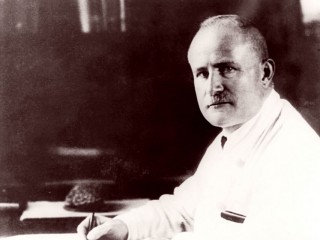
Hans Berger biography
Date of birth : 1873-05-21
Date of death : 1941-06-01
Birthplace : Neuses, Germany
Nationality : German
Category : Science and Technology
Last modified : 2011-08-12
Credited as : Physicist and scientist, human electroencephalograms , EEG
0 votes so far
German neuropsychiatrist Hans Berger proved the existence of electric voltage fluctuations in the human brain, and used an amplifying machine (an electroencephalograph) to record the first human electroencephalogram (EEG), measuring tiny changes in electrical flow between a pair of electrodes placed on a patient's skull. EEGs are now used to diagnose serious head injuries, brain tumors, epilepsy, and degenerative diseases of the nervous system. Prior to his EEG work, Berger had spent several years unsuccessfully seeking to correlate such factors as blood circulation and temperature with brain function. He later showed EEG variations between normal and brain-injured patients, and between patients with their eyes open and eyes closed. Berger conducted his early brain research in complete secrecy, and did not publish his until 1929, five years after his first EEG on 6 July 1924. Though not Jewish, he made no secret of his disdain for the growing Nazi movement in Germany, and for this he was stripped of his academic post in 1938. He hung himself three years later. His maternal grandfather was the poet Friedrich Rückert (1788-1866).
















